Interview with the cast of “Nicholas Nickleby” (2002)
by Chris Monroe
Staff Writer
(Looking for our film review? Click here.)
Several of the key players from the film “Nicholas Nickleby” joined me in New York for interviews near its December 2002 release. We discussed their interpretation and experiences with this new adaptation of Charles Dickens’ novel. These key players include: Anne Hathaway (Madeline Bray), Barry Humphries (Mrs. Crummles), Charlie Hunnam (Nicholas Nickleby), Jamie Bell (Smike), and director Douglas McGrath.
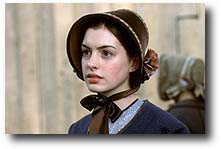 Anne Hathaway (“The Princess Diaries”) was the first to share. She had obviously done her research as an actor. Particularly interesting was her take on Madeline Bray as a co-dependent. Madeline’s mother is gone, has no brothers and sisters and lives to care for her ill father. She knows no other life, and is dependent upon by her father for survival. Hathaway’s portrayal of Madeline was an accurate depiction of co-dependency: someone who is so consumed with taking care of someone else that they believe it’s wrong to take care of themselves.
Anne Hathaway (“The Princess Diaries”) was the first to share. She had obviously done her research as an actor. Particularly interesting was her take on Madeline Bray as a co-dependent. Madeline’s mother is gone, has no brothers and sisters and lives to care for her ill father. She knows no other life, and is dependent upon by her father for survival. Hathaway’s portrayal of Madeline was an accurate depiction of co-dependency: someone who is so consumed with taking care of someone else that they believe it’s wrong to take care of themselves.
This maligned thinking by Madeline is finally confronted when Nicholas confesses his feelings for her. This is too much for Madeline. It is very difficult for her to accept and nearly turns Nicholas away. She tells him that it’s a problem she has, and that it is nothing to do with him. Indeed, she truly loves him, too, but, again, is skewed by her unhealthy upbringing.
The exchange here between Nicholas and Madeline is one that I asked both actors, Charlie and Anne about during the interview. Madeline confesses to Nicholas that she needs “saving.” She realizes the messed up thinking she has been living with, but feels incapable of doing anything about it. In a compelling response, Nicholas confesses that he, too, needs saving. This confession from Madeline is gripping, but not quite as surprising as when the hero of the story confesses it. Nicholas continues and claims that together, both he and Madeline will find salvation within themselves. The point seems to be that what they need is beyond them individually, but that there is hope through true love.
Anne Hathaway’s response to how she interpreted this scene was that Madeline needed saving from not being able to trust anyone. While preparing for the role, Anne said she told director, Douglas McGrath, that she didn’t want to have Madeline cry until this moment in the story. Up until then she seems depressed, but she wanted to hold Madeline back from actually crying until this scene. At this point she felt it was the first time Madeline had really opened up to anyone, and she found someone special—Nicholas—who was willing to really listen to her.
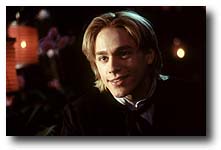 Charlie Hunnam said this was his favorite scene in the film. In response to how he interpreted these lines, he said that he endeavored to bring as much truth to it as he could. Charlie said that Nicholas is finally able to share his feelings with Madeline—something he had obviously been hoping to do for some time in the film. Other than that, Charlie said he enjoyed how well written the script was, which made playing it easier.
Charlie Hunnam said this was his favorite scene in the film. In response to how he interpreted these lines, he said that he endeavored to bring as much truth to it as he could. Charlie said that Nicholas is finally able to share his feelings with Madeline—something he had obviously been hoping to do for some time in the film. Other than that, Charlie said he enjoyed how well written the script was, which made playing it easier.
Unfortunately, the question on the interpretation of this scene was not presented to the director, Douglas McGrath. The director is the one who would be able to provide the in-depth meaning he was going for, but he was able to share some other insightful ideas that he included in this production (which will appear later in this article).
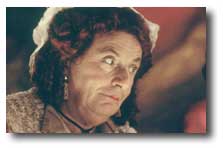 The most entertaining session was with actor Barry Humphries, known best as the old English woman he plays on television named “Dame Edna.” She is a character he has developed for years. Although she is a female character, Humphries did not rehash her for his interpretation of Mrs. Crummles. Humphries explained to us in a hilarious story how he was inspired in recreating the role of Mrs. Crummles.
The most entertaining session was with actor Barry Humphries, known best as the old English woman he plays on television named “Dame Edna.” She is a character he has developed for years. Although she is a female character, Humphries did not rehash her for his interpretation of Mrs. Crummles. Humphries explained to us in a hilarious story how he was inspired in recreating the role of Mrs. Crummles.
Back in Melbourne, Australia (Humphries’ home), was a fly-by-night theatre troupe called “The Sloggets.” Most of the actors in this group were “so far past their expiration date” that the audiences would inappropriately laugh at them. One particular woman in the cast, “Babbette Large,” was an old theatre lady and one hundred percent diva. In an outdoor performance, Babbette Large was making her entrance in her usual high heels. The grass they were performing on was particularly wet, which made for a mushy stage floor. When Babbette Large made her entrance, she sunk right into it. Humphries recalls that she was planted right into the ground and there was no moving her.
During the interview, Humphries kept the spirits light and the humor up—even when he was responding to something he didn’t agree with. One question was asked of him about how his kids felt about their dad cross-dressing as part of his job. Humphries obliged the question with a rhetorical one, asking if that wasn’t an American view of sexuality. He said that the mindset about this sort of thing is to ask yourself, “Is this person troubled in some way? What’s wrong with them?” Obviously, Humphries was making a point that an actor isn’t disturbed in some way by playing these kinds of rolls.
The original idea was to have Humphries play both Mr. And Mrs. Crummles, which would have been another entertaining choice. However, when Nathan Lane became available for the role of Mr. Humphries, they knew they were gaining a greater asset to the film. As stated in the review, the choice here of casting Humphries as Mrs. Crummles is for humor, and not some kind of homosexual overtone. Overall, Humphries states that what everyone wants is a good story. That’s what they look at most.
 Jamie Bell (“Billy Elliot”) was one of the most impressive to interview. This was mainly due to the fact that he is only sixteen years old and so very articulate. He says that starting so young in show business caused him to grow up a lot quicker. He worked with a choreographer for this role, which he loved, since he is already a dancer. This helped him hone in on the crippled aspect of his character, Smike. In interpreting this role, Jamie stated that Nicholas is a “savior” to Smike, and that in a way, we all need saving.
Jamie Bell (“Billy Elliot”) was one of the most impressive to interview. This was mainly due to the fact that he is only sixteen years old and so very articulate. He says that starting so young in show business caused him to grow up a lot quicker. He worked with a choreographer for this role, which he loved, since he is already a dancer. This helped him hone in on the crippled aspect of his character, Smike. In interpreting this role, Jamie stated that Nicholas is a “savior” to Smike, and that in a way, we all need saving.
Douglas McGrath (Academy Award nomination Best Director for “Emma”) was the last of the interviews, but obviously not the least. As the kingpin of the production, the questions asked of him were certainly more poignant, and the things he said plummeted me further into different facets of this story (which there is no time to get into here). At this point with the interviews, he had already talked to five other groups, so he was very warmed up.
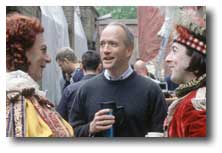 To start with, McGrath stated clearly that this story holds two messages that are relevant to every generation. The first is:
To start with, McGrath stated clearly that this story holds two messages that are relevant to every generation. The first is:
- How do I (as a young person entering the world) remain good while dealing with a world of evil?
The second is: - In order to find happiness, you need to belong to someone.
In this story, Nicholas deals with different evil characters. Dickens clearly carves out these characters (the Squeers, Uncle Ralph) so that there are no real mysteries as to if they are good or bad. Uncle Ralph is indifferent to his brother’s death and is reluctant to take care of his family. Furthermore, he uses his own niece, Kate, as a lure to help make business deals, and doesn’t stand up for her when inappropriate things are said to her. The Squeers abuse young boys and are willing to compromise almost anything to make more money. (In this vein, they are very similar to the Innkeeper and his wife in “Les Miserables”.)
At the end of the film, a hymn is sung that states “The glory of the Lord shall fill the Earth as the waters cover the sea.” McGrath said that he chose this hymn first, because he loves it, and also because of what it says in the film. Uncle Ralph says, “The world knows what kind of man I am, and I never grow poorer.” Ralph believes that he can live whatever way he wants to and it doesn’t matter because he still has all his riches. Nothing will disrupt his life. But his dark, unresolved past lurks over him and everything he trusts eventually falls. And, at the end, what is really good and right prevails for everyone to see.
McGrath shared what he believes about evil, which seems to match up to the truth stated in James that you reap what you sow. McGrath said that there are people in the world who live any way they choose and no one else seems to care. Others who do right wonder how that can be and why they are able to get away with it. But—and it is evident in this story—McGrath believes that eventually, the world does care. There is an end to the evildoing. What they have done will catch up with them.
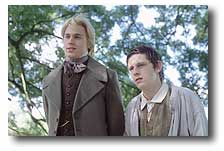 Regarding McGrath’s second statement about the message of this story, it is clear that it is about family. “Belonging to someone” involves finding a life-long soul mate, but also involves being a brother, a mother, or a friend. Nicholas becomes the leader of his family, is a devoted brother to Kate, and befriends Smike as well as countless other people. And, interestingly, most of the people Nicholas becomes friends with are those who are underprivileged or outcasts in some way. Dickens was obviously showing support and concern (and arousing it in his readers) for orphans, crippled people, those without family—even actors. (Yes, actors were considered one of the lowest groups in society then.)
Regarding McGrath’s second statement about the message of this story, it is clear that it is about family. “Belonging to someone” involves finding a life-long soul mate, but also involves being a brother, a mother, or a friend. Nicholas becomes the leader of his family, is a devoted brother to Kate, and befriends Smike as well as countless other people. And, interestingly, most of the people Nicholas becomes friends with are those who are underprivileged or outcasts in some way. Dickens was obviously showing support and concern (and arousing it in his readers) for orphans, crippled people, those without family—even actors. (Yes, actors were considered one of the lowest groups in society then.)
This film has already been nominated for a Golden Globe Award. It wouldn’t come as a surprise if the Oscars give it a nod for Best Adaptation, or even for Production Design. The costuming and lighting are rich, too, and of course the cast gives excellent performances—especially Jim Broadbent.
See our REVIEW of “Nicholas Nickleby”